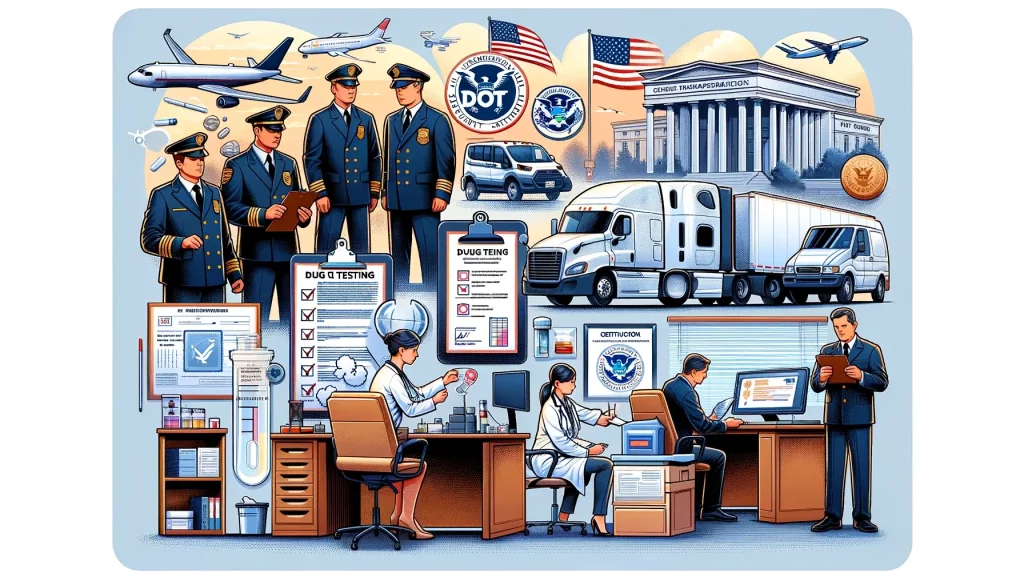Table of Contents
Employees in jobs where safety is a concern, such as truck drivers and those who run buses, trains, and airplanes, must submit to DOT drug tests. This blog will cover everything you need about DOT drug testing, including DOT regulations, DOT-certified labs, and the return-to-duty process.
DOT employers must administer various drug and alcohol tests, including breath, saliva, and hair follicle tests. They must also provide a return-to-duty program that includes contact information for a substance abuse professional.
What is a DOT-Compliant Drug Testing Program?
A DOT-compliant drug testing program follows the Department of Transportation (DOT) rules and regulations. This includes 49 CFR Part 40 and the individual DOT agency regulations for airline, railroad, highway traffic, pipeline, and port safety.
The DOT drug testing Houston, TX includes procedures for pre-employment, random, reasonable suspicion, return-to-duty, and follow-up testing. It also requires a qualified and experienced C/TPA to oversee all aspects of the program, including collection, results reporting, and preparing for DOT audits.
A service agent is any person or organization that performs services related to an employer’s DOT drug and alcohol program, such as a collector, BAT, MRO, SAP, or STT. Qualification training is necessary for these individuals to ensure they meet DOT requirements. A service agent must be a part of an approved DOT drug and alcohol testing consortium.
What is a DOT-Compliant Drug Testing Company?
A DOT-Compliant drug testing company adheres to Department of Transportation regulations. These include pre-employment, random, reasonable suspicion, and post-accident drug tests. DOT compliance also involves maintaining records and sending results to the laboratory according to DOT guidelines. DOT-compliant test sites use collection kits that meet DOT requirements for storing urine samples until they are sent to the lab. Employees are not allowed to substitute, dilute, or adulterate their samples in any way.
Any company that works in the transportation industry must comply with DOT drug testing regulations. These include trucking, shipping, aviation, rail, and transit companies. Safety-sensitive positions like drivers and crew members are subject to DOT testing. Taking illicit drugs can be dangerous for both employees and travelers. DOT tests screen for five types of illicit substances.

What is a DOT-Compliant Post-Accident Drug Test?
DOT-compliant post-accident drug tests involve a urine sample collected and analyzed in a lab certified by the DOT. The DOT also requires that specific devices used for testing, such as breath alcohol or DUI evaluations given by law enforcement officers at the scene of an accident, must be verified as DOT-compliant.
DOT agencies, such as the FMCSA, require that safety-sensitive employees undergo a DOT drug test in these circumstances. Additionally, suppose an employee is determined to be at fault for an accident and subsequently fails a DOT drug test or refuses to take one. In that case, they can be removed from safety-sensitive duties immediately. The DOT mandates follow-up testing be conducted the following year to ensure the employee can return to work.
What is a DOT-Compliant Drug Testing Policy?
A DOT-compliant drug testing policy meets the Department of Transportation’s (DOT) drug and alcohol testing requirements. These requirements impact jobs regulated by the DOT, such as truck driving and other safety-sensitive positions. DOT-compliant policies must describe how an employer will administer its drug and alcohol testing program.
DOT-compliant programs must also be transparent about the process and clarify to employees what information will be shared with outside parties. They must also clearly separate DOT test records from non-DOT test records.
DOT-compliant urine tests typically look for five types of drugs. These include marijuana and hashish, cocaine and its derived substances, PCP and opiates such as morphine and codeine, and amphetamines, including methamphetamine. Most DOT-compliant tests are not observed, but an observer must directly observe return-to-duty and follow-up DOT drug tests to ensure the specimen is not tampered with.
Read Also: Physical Therapist Home Health Jobs: Make a Difference in Patients’ Lives
What is a DOT-Compliant Drug Testing Program?
A DOT-compliant drug testing program adheres to the Department of Transportation’s (DOT) regulations. These regulations govern the administration of workplace drug tests for safety-sensitive employees. These include drivers with commercial driver’s licenses (CDL), those who transport passengers, or those who work in a regulated industry like railway workers, “hours of service” employees, road crew members, and “regulated service” contractors.
A DOT-compliant drug testing program must also include training for BATs and collectors, validation procedures for test results, and SAP evaluations. A DOT-compliant drug testing program must include a C/TPA coordinating your company’s testing services. This includes urine collection, laboratory testing, MRO services, SAP, and return-to-duty evaluations. This C/TPA must be certified by a recognized DOT agency or health and safety organization.


